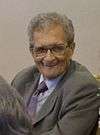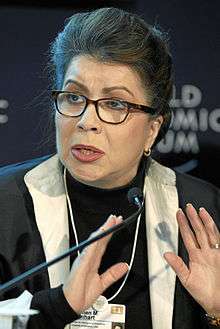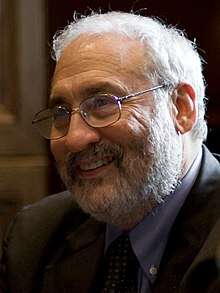Institute for New Economic Thinking
The Institute for New Economic Thinking (INET) is a New York City–based nonprofit think tank. It was founded in October 2009 as a result of the 2007–2012 global financial crisis, and runs a variety of affiliated programs at major universities such as the Cambridge-INET Institute at the University of Cambridge.
| Formation | October 2009 |
|---|---|
| Founder | James Balsillie, William H. Janeway, George Soros |
| Type | Think tank |
| Legal status | 501(c)(3) research and education nonprofit organization |
| Headquarters | New York City, United States |
| Fields | Macroeconomic and Post-Keynesian theory and policy |
President | Robert Johnson |
Chairman of the Governing Board | Adair Turner |
| Affiliations | University of Cambridge |
Revenue (2017) | $6,229,081[1] |
| Expenses (2017) | $14,841,294[1] |
| Website | ineteconomics |
Funding
INET was founded with an initial pledge of $50 million from George Soros. It has since been supplemented by donations from James Balsillie and William H. Janeway, together with other philanthropists and financiers, including Paul Volcker, David Rockefeller, the Malcolm Hewitt Wiener Foundation, the Alfred P. Sloan Foundation, the Carnegie Corporation of New York, and Stiftung Mercator. Later funding has come from the Keynes Fund for Applied Economics and the Isaac Newton Trust at the University of Cambridge.
Advisory board



The INET advisory board includes nobel laureates George Akerlof, James Heckman,[2] Sir James Mirrlees, Amartya Sen, A. Michael Spence, and Joseph Stiglitz, as well as other prominent economists such as Markus K. Brunnermeier, Willem Buiter, Wendy Carlin, Paul Davidson, Robert Dugger, Ottmar Edenhofer,[3] Barry Eichengreen,[4] Thomas Ferguson, Duncan K. Foley, Roman Frydman, Ian Goldin, Charles Goodhart, Andy Haldane,[5] David Hendry,[6] Simon Johnson,[7] Anatole Kaletsky, John Kay, Richard Koo,[8] Axel Leijonhufvud, Perry Mehrling, Zhu Min,[9] Y.V. Reddy, Carmen Reinhart, Hélène Rey, Ken Rogoff, Jeffrey Sachs, John Shattuck, Andrés Velasco,[10] and William White and Yu Yongding.[11]
Affiliates
The Institute has disbursed approximately $4 million annually in research grants to students and professors. The Cambridge-INET Institute (co-funded with William H. Janeway) established an advanced institute for economic thinking at the University of Cambridge, The Cambridge-INET Institute was endowed with $3.75 million grant from the Keynes Fund for Applied Economics, Isaac Newton Trust, and the University of Cambridge Faculty of Economics. Similar collaborations exist with the INET at the Oxford Martin School, which was co-funded by James Martin, as well as the INET Center on Imperfect Knowledge Economics (IKE) at the University of Copenhagen.
Programs and projects
Research programs supported by INET include:
- The Human Capital and Economic Opportunity Global Working Group, headed by James Heckman, is affiliated with the Becker Friedman Institute for Research in Economics at University of Chicago.[12]
- History of Economic Thought taskforce, headed by Bruce Caldwell of Duke University.
- Eric Beinhocker, executive director of INET-Oxford, independently authored a book introducing some of the ideas held by some INET-associated economists, The Origin of Wealth.[13]
Administration
The executive director is Robert Johnson, former managing director at the hedge funds Soros Fund Management and Moore Capital Management.[14]
See also
References
- "The Institute for New Economic Thinking Inc" (PDF). Candid. 11 December 2018. Retrieved 26 November 2019.
- "James Heckman". Institute for New Economic Thinking. Retrieved 26 June 2018.
- "Ottmar Edenhofer". Institute for New Economic Thinking. Retrieved 26 June 2018.
- "Barry Eichengreen". Institute for New Economic Thinking. Retrieved 26 June 2018.
- "Andy Haldane". Institute for New Economic Thinking. Retrieved 26 June 2018.
- "David Hendry". Institute for New Economic Thinking. Retrieved 26 June 2018.
- "Simon Johnson". Institute for New Economic Thinking. Retrieved 26 June 2018.
- "Richard Koo". Institute for New Economic Thinking. Retrieved 26 June 2018.
- "Zhu Min". Institute for New Economic Thinking. Retrieved 26 June 2018.
- "Andrés Velasco". Institute for New Economic Thinking. Retrieved 26 June 2018.
- "About INET: Leadership Archived 2014-07-01 at the Wayback Machine." Institute for New Economic Thinking web page. Retrieved 10 June 2013.
- "The Human Capital and Economic opportunity Global Working Group". The University of Chicago. 27 December 2011. Retrieved 28 December 2012.
- Beinhocker, Eric D. (2006). The Origin of Wealth: Evolution, Complexity, and the Radical Remaking of Economics Archived 2013-08-24 at the Wayback Machine. Harvard Business School Press. Retrieved 8 June 2013. ISBN 978-1-57851-777-0.
- Irwin, Neil (29 July 2010). "A crossroads for the U.S. economy". Washington Post. Retrieved 27 January 2011.